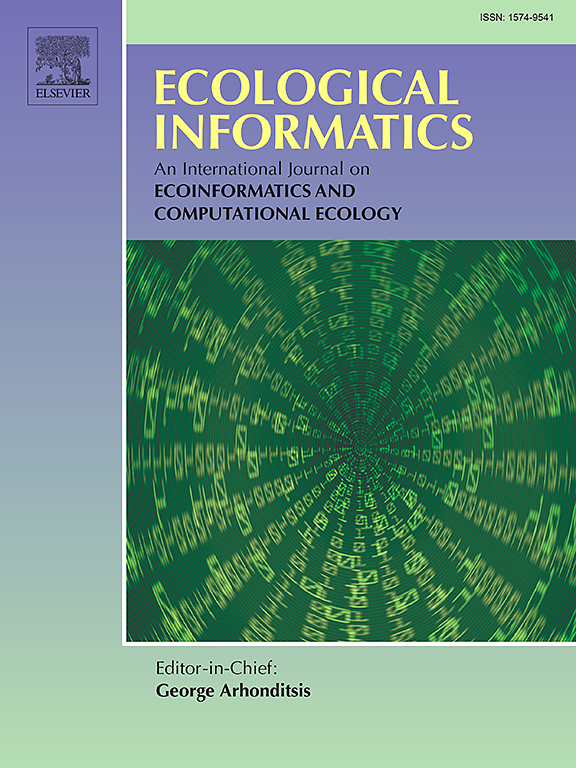Framework for deep learning diagnosis of plant disorders in horticultural crops: From data collection tools to user-friendly web and mobile apps
IF 5.8
2区 环境科学与生态学
Q1 ECOLOGY
引用次数: 0
Abstract
Food security is a pressing global concern, particularly highlighted by the United Nations Sustainable Development Goal 2 (SDG 2), which focuses on enhancing the productivity and incomes of smallholder farmers. In the Middle East and North Africa (MENA) region, horticultural crops are increasingly threatened by pests and diseases, exacerbated by climate change. Local farmers often lack the necessary expertise to effectively manage these issues, resulting in significant reductions in both yield and quality of their crops. This study seeks to develop an accessible mobile crop diagnosis application. By utilizing machine learning and deep learning technologies, the app is designed to help MENA farmers quickly and accurately identify and treat crop disorders. We used Open Data Kit (ODK) to gather a large dataset of crop images required to train deep learning models. These models, built on open-source deep learning architectures, were designed to classify 21 different leaf disorders, including diseases, pests, and nutritional deficiencies. The system was implemented in both a web app and an Android mobile app. Our deep learning models demonstrated an overall accuracy of 94 % in diagnosing plant disorders. The app, Doctor Nabat, includes a decision support system that offers treatment options in the three primary languages spoken in the MENA region. Doctor Nabat is an effective and scalable tool for enhancing crop management in the MENA region, promoting food security by minimizing crop losses through improved pest and disease diagnosis and treatment strategies.
园艺作物植物病害深度学习诊断框架:从数据收集工具到用户友好型网络和移动应用程序
粮食安全是一个紧迫的全球问题,联合国可持续发展目标 2(SDG 2)尤其强调了这一点,其重点是提高小农的生产力和收入。在中东和北非(MENA)地区,园艺作物日益受到病虫害的威胁,而气候变化又加剧了这一威胁。当地农民往往缺乏有效管理这些问题所需的专业知识,导致作物产量和质量大幅下降。本研究旨在开发一款便于使用的移动作物诊断应用程序。通过利用机器学习和深度学习技术,该应用旨在帮助中东和北非地区的农民快速准确地识别和治疗作物病害。我们使用开放数据工具包(ODK)收集了训练深度学习模型所需的大量作物图像数据集。这些模型建立在开源深度学习架构上,旨在对 21 种不同的叶片病害进行分类,包括病害、虫害和营养缺乏症。该系统通过网络应用程序和安卓手机应用程序实施。我们的深度学习模型在诊断植物疾病方面的总体准确率达到 94%。这款名为 "Doctor Nabat "的应用程序包括一个决策支持系统,可提供中东和北非地区三种主要语言的治疗方案。Doctor Nabat 是加强中东和北非地区作物管理的有效且可扩展的工具,通过改进病虫害诊断和治疗策略,最大限度地减少作物损失,从而促进粮食安全。
本文章由计算机程序翻译,如有差异,请以英文原文为准。
求助全文
约1分钟内获得全文
求助全文
来源期刊

Ecological Informatics
环境科学-生态学
CiteScore
8.30
自引率
11.80%
发文量
346
审稿时长
46 days
期刊介绍:
The journal Ecological Informatics is devoted to the publication of high quality, peer-reviewed articles on all aspects of computational ecology, data science and biogeography. The scope of the journal takes into account the data-intensive nature of ecology, the growing capacity of information technology to access, harness and leverage complex data as well as the critical need for informing sustainable management in view of global environmental and climate change.
The nature of the journal is interdisciplinary at the crossover between ecology and informatics. It focuses on novel concepts and techniques for image- and genome-based monitoring and interpretation, sensor- and multimedia-based data acquisition, internet-based data archiving and sharing, data assimilation, modelling and prediction of ecological data.
 求助内容:
求助内容: 应助结果提醒方式:
应助结果提醒方式:


